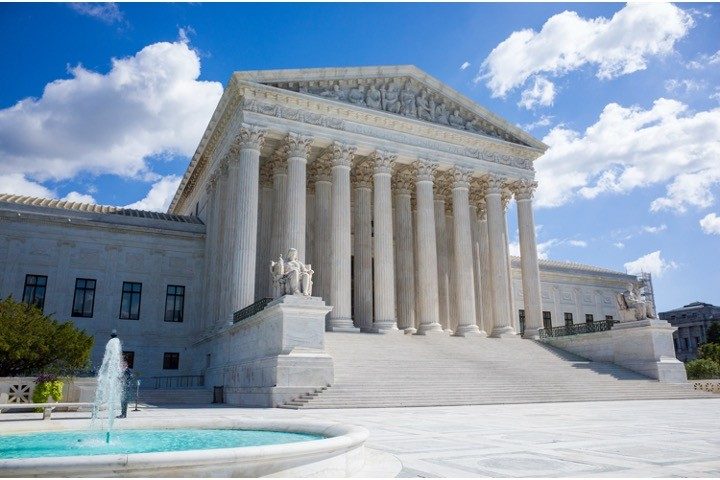
The U.S. Supreme Court agreed on Monday to review lower courts’ rulings enabling federal observers to ride along on fishermen’s boats to make sure they are following federal rules.
In Loper Bright Enterprises v. Gina Raimondo, a small fishing company operating out of Cape May, New Jersey, joined with several others in protesting the imposition of National Marine Fisheries Service (NMFS) rules that require them to take on board a federal official to observe their practices, and pay them for the privilege.
From the appeal, lawyers for Loper Bright made it clear why they were suing Gina Raimondo, the secretary of commerce, in whose agency the NMFS resides:
Operating fishing vessels in the Atlantic is hard work. The vessel operators tend to be small, family-owned enterprises. The profit margins are tight, and the quarters onboard are tighter still. The typical vessel has room for only five or six individuals.
Nonetheless, the Magnuson-Stevens Act (MSA) requires petitioners and other vessel owners to make room onboard for federal observers who can oversee operations to ensure compliance with a slew of federal regulations.
That is an extraordinary imposition that few would tolerate on dry land. But without any express statutory authorization, the National Marine Fisheries Service (NMFS) has decided to go one very large step further and require petitioners to pay the salaries of government-mandated monitors who take up valuable space on their vessels and oversee their operations….
In a country that values limited government and the separation of powers, such an extraordinary power should require the clearest of congressional grants.
For years, courts have abrogated their responsibilities under the “separation of powers” doctrine to rein in unconstitutional law. Those responsibilities emanated from what many have called “the single most important decision in American constitutional law”: Marbury v. Madison, decided in 1803. Chief Justice John Marshall held that “Congress cannot pass laws that are contrary to the Constitution, and it is the role of the judiciary to interpret what the Constitution permits.”
But when Congress began delegating its legislative powers (violating Article 1, Section 1 of the Constitution: “All legislative powers herein granted shall be vested in a Congress of the United States”) few alarm bells were rung, and the Fourth Branch of government began to infest and insinuate itself into the minutest behaviors of the citizens the Constitution was designed to protect. That included the rule promulgated by the NMFS that precipitated the present complaint and might, with any luck, put an end to, or at least put a major crimp, in that growth.
In 1984, the Supreme Court codified the unconstitutional delegation in Chevron U.S.A, Inc. v. Natural Resources Defense Council, Inc. (aka Chevron) by holding that “where the intent of Congress [in its delegation of its powers] was ambiguous and the [agency’s] interpretation [of Congress’ intent] was reasonable,” such delegation of powers was thereby legal and enforceable.
Time passed, and the Fourth Branch grew beyond comprehension. There are 15 major agencies in the Executive Branch (the Department of Commerce, the Department of Agriculture, the Department of Defense, the Department of Education, the Department of Energy, the Department of Health and Human Services, etc., etc.) under which have spawned a total of 434 federal agencies. Each is filled with thousands of unelected (and overwhelmingly liberal in their political ideology) bureaucrats crafting rules and regulations for the rest of us.
But the worm has turned, and it just may be that the fishermen who were so outraged over the government agency’s overreach that they filed suit may just lead to an emasculation of Chevron. In 2016, before joining the Supreme Court, 10th Circuit Court Judge Neal Gorsuch complained, ”[The Chevron decision, or “Chevron deference”] is a problem for the people whose liberties may now be impaired not by an independent decisionmaker … promised to them by law — but by an avowedly politicized administrative agent seeking to pursue whatever policy whim may rule the day.”
A year earlier, Supreme Court Justice Clarence Thomas voiced his disapproval of Chevron because it “wrests from courts the ultimate interpretive authority to ‘say what the law is’ [per Marbury] and hands it over to the Executive [Branch].”
The fishermen claim that the time is now ripe for at least a second look at Chevron, if not a total rejection of it:
In sum, the decision [from lower courts] vividly illustrates that Chevron is overdue for either a reboot or an overruling. Simply ignoring it will just lead to more problematic results like the decision below.
Thus, as Justice Gorsuch recently emphasized: “No measure of silence (on this Court’s part) and no number of separate writings (on my part and so many others) will protect [Americans]. At this late hour, the whole [Chevron] project deserves a tombstone no one can miss.”
So says Adi Dynar, an attorney at Pacific Legal Foundation who is watching the case closely:
Loper Bright Enterprises v. Raimondo gives the Supreme Court an opportunity to put an end to unconstitutional deference to government agencies once and for all.
The Constitution recognizes no exception to the judicial power to say what the law is. The Court now has the opportunity to state the obvious: federal courts are not required to permit agencies to make a travesty of the Constitution’s separation of powers and due process of law by deferring to an agency’s interpretation of the law.
The high court will hear arguments in the case this fall, with a decision to be rendered next summer.



